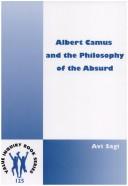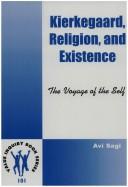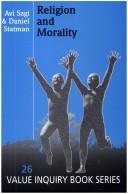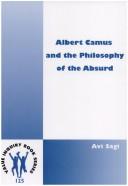| Listing 1 - 10 of 14 | << page >> |
Sort by
|
Book
ISBN: 3319991787 3319991779 Year: 2018 Publisher: Cham : Springer International Publishing : Imprint: Springer,
Abstract | Keywords | Export | Availability | Bookmark
 Loading...
Loading...Choose an application
- Reference Manager
- EndNote
- RefWorks (Direct export to RefWorks)
The book grapples with one of the most difficult questions confronting the contemporary world: the problem of the other, which includes ethical, political, and metaphysical aspects. A widespread approach in the history of the discourse on the other, systematically formulated by Emmanuel Levinas and his followers, has invested this term with an almost mythical quality—the other is everybody else but never a specific person, an abstraction of historical human existence. This book offers an alternative view, turning the other into a real being, through a carefully described process involving two dimensions referred to as the ethic of loyalty to the visible and the ethic of inner retreat. Tracing the course of this process in life and in literature, the book presents a broad and lucid picture intriguing to philosophers and also accessible to readers concerned with questions touching on the meaning of life, ethics, and politics, and particularly relevant to the burning issues surrounding attitudes to immigrants as others and to the relationship with God, the ultimate other. .
Phenomenology . --- Social justice. --- Judaism-Doctrines. --- Existential psychology. --- Existentialism. --- Phenomenology. --- Social Justice, Equality and Human Rights. --- Jewish Theology. --- Existential approach. --- Existenzphilosophie --- Ontology --- Phenomenology --- Philosophy, Modern --- Epiphanism --- Relationism --- Self --- Psychology, Existential --- Existentialism --- Phenomenological psychology --- Psychoanalysis --- Equality --- Justice --- Human rights. --- Judaism—Doctrines. --- Basic rights --- Civil rights (International law) --- Human rights --- Rights, Human --- Rights of man --- Human security --- Transitional justice --- Truth commissions --- Law and legislation --- Judaism --- Clinical psychology. --- Philosophy of mind. --- Self. --- Human Rights. --- Clinical Psychology. --- Philosophy of the Self. --- Personal identity --- Consciousness --- Individuality --- Mind and body --- Personality --- Thought and thinking --- Will --- Mind, Philosophy of --- Mind, Theory of --- Theory of mind --- Philosophy --- Cognitive science --- Metaphysics --- Philosophical anthropology --- Psychiatry --- Psychology, Applied --- Psychological tests --- Jewish theology --- Theology, Jewish --- Doctrines.
Digital
ISBN: 9783030822422 9783030822439 9783030822446 9783030822415 Year: 2021 Publisher: Cham Palgrave Macmillan
Abstract | Keywords | Export | Availability | Bookmark
 Loading...
Loading...Choose an application
- Reference Manager
- EndNote
- RefWorks (Direct export to RefWorks)
The relationship between morality and religion has long been controversial, familiar in its formulation as Euthyphro's dilemma: Is an act right because God commanded it or did God command it because it is right. In Morality and Religion: The Jewish Story, renowned scholar Avi Sagi marshals the breadth of philosophical and hermeneutical tools to examine this relationship in Judaism from two perspectives. The first considers whether Judaism adopted a thesis widespread in other monotheistic religions known as 'divine command morality,' making morality contingent on God's command. The second deals with the ways Jewish tradition grapples with conflicts between religious and moral obligations. After examining a broad spectrum of Jewish sources-including Talmudic literature, Halakhah, Aggadah, Jewish philosophy, and liturgy-Sagi concludes that mainstream Jewish tradition consistently refrains from attempts to endorse divine command morality or resolve conflicts by invoking a divine command. Rather, the central strand in Judaism perceives God and humans as inhabiting the same moral community and bound by the same moral obligations. When conflicts emerge between moral and religious instructions, Jewish tradition interprets religious norms so that they ultimately pass the moral test. This mainstream voice is anchored in the meaning of Jewish law, which is founded on human autonomy and rationality, and in the relationship with God that is assumed in this tradition. .
General ethics --- Jewish religion --- ethiek
Multi
ISBN: 9783031273919 9783031273902 9783031273926 9783031273933 Year: 2023 Publisher: Cham Springer Nature, Imprint: Palgrave Macmillan
Abstract | Keywords | Export | Availability | Bookmark
 Loading...
Loading...Choose an application
- Reference Manager
- EndNote
- RefWorks (Direct export to RefWorks)
An epidemic such as COVID-19 challenges life's very order and meaning, interferes in our relations with others, and breaks apart our routine. It raises many questions in the realms of ethics, politics, theology, psychology, and beyond. Perhaps more than anything else, it prompts us to ponder: what does this encounter with widespread anguish and distress imply about the human self-perception as sovereign rulers of Earthly life? In this book, renowned thinker Avi Sagi explores the existential matters brought to the philosophical fore by the pandemic. He shows how we, when thrown into the terror of a crisis, carry the traditions, values, ideals, hopes, failures, and habits that constitute our lives, all shaping the way we grapple with questions seemingly resolved. We may then find that the crack that opens up at times of sorrow can also be a moment of discovery. Sagi analyzes various ways of confronting the crack now at the heart of our existence. What emerges is a clear normative statement: We are not only what we were but also what we can be, and we can create a world of meaning by standing together with others.
Philosophy --- Jewish religion --- Social sciences (general) --- filosofie --- sociale wetenschappen --- Jodendom

ISBN: 9789004493452 9789042012301 Year: 2002 Publisher: Leiden; Boston : BRILL
Abstract | Keywords | Export | Availability | Bookmark
 Loading...
Loading...Choose an application
- Reference Manager
- EndNote
- RefWorks (Direct export to RefWorks)
This book is an attempt to read the totality of Camus's oeuvre as a voyage, in which Camus approaches the fundamental questions of human existence: What is the meaning of life? Can ultimate values be grounded without metaphysical presuppositions? Can the pain of the other penetrate the thick shield of human narcissism and self-interest? Solipsism and solidarity are among the destinations Camus reaches in the course of this journey. This book is a new reading of one of the towering humanists of the twentieth century, and sheds new light on his spiritual world.

ISBN: 9789004493964 9789042014121 Year: 2000 Publisher: Leiden; Boston : BRILL
Abstract | Keywords | Export | Availability | Bookmark
 Loading...
Loading...Choose an application
- Reference Manager
- EndNote
- RefWorks (Direct export to RefWorks)
This book is an original philosophic exploration of the meaning of Kierkegaard's life, his thought, and his works. It makes a bold case for Kierkegaard's recognition of the concrete existence of the individual, including Kierkegaard himself, as crucial to the spiritual life. Written with delicate insight, and beautifully translated from Hebrew, this work offers valuable new turns to understanding the puzzling life-work of a modern giant of spiritual reflection.
Religion --- Self (Philosophy) --- Philosophy
Book
ISBN: 9781618115355 1618115359 9781618115348 1618115340 Year: 2016 Publisher: Boston, MA
Abstract | Keywords | Export | Availability | Bookmark
 Loading...
Loading...Choose an application
- Reference Manager
- EndNote
- RefWorks (Direct export to RefWorks)
Two basic approaches have shaped the identity discourse since antiquity. The essentialist view assumes that a person's identity does exist "somewhere," and the discourse on identity is an attempt to disclose it. People do not create their identity, they only realize it. The opposite, deconstructionist view, assumes that the identity is only a linguistic fiction; we have no identity outside our concrete history, which reflects a constantly ongoing dynamic change. The present book offers a third option. It accepts that identity is not a priori datum that precedes our existence but claims we do have a set historical cultural identity it calls "primary," expressing a permanent foundation of our biography. On its basis, we build our concrete identity. Engaging in a critical analysis, the book exposes the foundations and the borders of the identity field. As a test case that illustrates its claims, it presents the discourse on Jewish identity. Lively, vigorous, and widely recorded, this discourse conveys many nuances of the tension between continuity and change and is thus uniquely fit to convey the significance of the identity discourse.
Jews --- Hebrews --- Israelites --- Jewish people --- Jewry --- Judaic people --- Judaists --- Ethnology --- Religious adherents --- Semites --- Judaism --- Identity --- Philosophy.
Book
ISBN: 1618114530 9781618114532 9781618114525 1618114522 Year: 2015 Publisher: Boston, MA
Abstract | Keywords | Export | Availability | Bookmark
 Loading...
Loading...Choose an application
- Reference Manager
- EndNote
- RefWorks (Direct export to RefWorks)
Religious-Zionism developed in Israel as an attempt to combine halakhic commitment with the values of modernity, two networks of meaning not easily reconciled. This book presents a study of the discourse on the body and sexuality within religious-Zionism as it has developed in recent decades, including in cyberspace, and considers such issues as homosexuality, lesbianism, masturbation, and the relationships between the sexes. It also analyzes the shift to a pastoral discourse and alternative religious perspectives dealing with this discourse together with its far wider social and cultural implications, offering a new paradigm for reading religious cultures.
Book
ISBN: 1618115049 9781618115041 1618115030 9781618115034 Year: 2016 Publisher: Boston, MA
Abstract | Keywords | Export | Availability | Bookmark
 Loading...
Loading...Choose an application
- Reference Manager
- EndNote
- RefWorks (Direct export to RefWorks)
The widespread view is that prayer is the center of religious existence and that understanding the meaning of prayer requires that we assume God is its sole destination. This book challenges this assumption and, through a phenomenological analysis of the meaning of prayer in modern Hebrew literature, shows that prayer does not depend at all on the addressee-humans are praying beings. Prayer is, above all, the recognition that we are free to transcend the facts of our life and an expression of the hope that we can override the weight of our past and present circumstances.
Hebrew poetry, Modern --- Hebrew literature, Modern --- History and criticism.

ISBN: 9789004463868 9789051838381 Year: 1995 Publisher: Leiden; Boston : BRILL
Abstract | Keywords | Export | Availability | Bookmark
 Loading...
Loading...Choose an application
- Reference Manager
- EndNote
- RefWorks (Direct export to RefWorks)
Religion and Morality seeks to answer two fundamental questions regarding the relation between religion and morality. The first is the puzzle posed by Socrates, the so-called ' Euthyphro dilemma', which asks: is morality valuable by virtue of its intrinsic importance and worth, or is morality valuable because, and only because, God approves it and commands us to follow its dictates? The second question is raised by Kierkegaard in Fear and Trembling . He asks: Is a conflict between religion and morality possible? Does God ever demand that we neglect our moral commitments? The discussion on these questions is divided into three parts. In the first two parts, we discuss the idea that morality depends on religion. The authors distinguish two types of dependence: strong dependence, according to which the very existence, or validity, of moral obligations depends on God's command, and weak dependence, according to which though morality itself is independent of God, God (or belief in God) is necessary to enable human beings to know their moral duties and to carry them out. The authors reject the strong dependence thesis, as well as most versions of the weak dependence. The third part of the book discusses different versions of the view that religion might conflict with morality. The authors reject this view, and show that very few religious thinkers would follow it all the way through to its ultimate consequences. The book has implications for the philosophy of religion, in its emphasis on the centrality of the moral element in religion, and for moral philosophy, in its highlighting, among other things, of the nature of moral judgments.
Ethics --- Morality --- Philosophy --- Religion

ISBN: 9042012307 Year: 2002 Publisher: Amsterdam New York Rodopi
Abstract | Keywords | Export | Availability | Bookmark
 Loading...
Loading...Choose an application
- Reference Manager
- EndNote
- RefWorks (Direct export to RefWorks)
| Listing 1 - 10 of 14 | << page >> |
Sort by
|

 Search
Search Feedback
Feedback About UniCat
About UniCat  Help
Help News
News